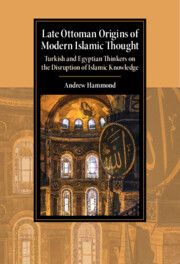 Late Ottoman Origins of Modern Islamic Thought
Late Ottoman Origins of Modern Islamic Thought Book contents
- Late Ottoman Origins of Modern Islamic Thought
- Cambridge Studies in Islamic Civilization
- Late Ottoman Origins of Modern Islamic Thought
- Copyright page
- Contents
- Figures
- Preface
- Note on Style
- 1 The Late Ottoman Intellectual Tradition
- 2 Ottoman Exiles
- 3 The Ottoman Scholars and Their Reception of Muḥammad ʿAbduh
- 4 The Salafi Revolution
- 5 Nation-State, Islamic State
- 6 The Late Ottomans’ Impact on Modern Islamic Thought
- Appendices
- Bibliography
- Index
- Other titles in the series
5 - Nation-State, Islamic State
The Egypt Exiles and New Political Imaginaries
Published online by Cambridge University Press: 03 November 2022
- Late Ottoman Origins of Modern Islamic Thought
- Cambridge Studies in Islamic Civilization
- Late Ottoman Origins of Modern Islamic Thought
- Copyright page
- Contents
- Figures
- Preface
- Note on Style
- 1 The Late Ottoman Intellectual Tradition
- 2 Ottoman Exiles
- 3 The Ottoman Scholars and Their Reception of Muḥammad ʿAbduh
- 4 The Salafi Revolution
- 5 Nation-State, Islamic State
- 6 The Late Ottomans’ Impact on Modern Islamic Thought
- Appendices
- Bibliography
- Index
- Other titles in the series
Summary
This chapter looks at Mehmed Akif’s fundamental acceptance of the nation-state and reconciliation of Turkish and Islamic identity and sets that against Sabri and Kevseri’s theoretical objections, which centre on the argument that the shariʿa system with its notion of a legal and moral core above the manipulations of politics and society was superior to man-made law. Noting that their work came (1) as Egypt finalised the process of codification and de-Islamisation of its courts and (2) as the era of military authoritarianism began its long reign in the Arab region, it goes on to examine Sabri’s development of a radical view of Islamic faith and identity in the context of the modern state and how this may have impacted Sayyid Quṭb’s thinking.
- Type
- Chapter
- Information
- Late Ottoman Origins of Modern Islamic ThoughtTurkish and Egyptian Thinkers on the Disruption of Islamic Knowledge, pp. 189 - 239Publisher: Cambridge University PressPrint publication year: 2022
